If you're trying to hire physician assistants right now, you already know: it’s a competitive, high-pressure market. The U.S. is facing a major provider shortage of up to 64,000 fewer physicians by the end of 2025, according to McKinsey. That shortfall is pushing more systems to rely on PAs, especially in primary care.
The catch? There still aren’t enough of them in the right places.
Only about 28,000 certified PAs are working in primary care nationwide, far below the 87,000+ full-time primary care providers the U.S. is projected to need by 2037. Even though the PA workforce has grown 28% since 2018, hiring is still tough, especially if you’re dealing with urgent staffing gaps, rural coverage needs, or high-volume patient loads.
That’s where specialized recruiting firms come in. The right partner can help you source, vet, and hire qualified PAs faster without compromising quality or clinical fit.
This article gives you a shortlist of 10 physician assistant recruiting firms worth checking out. Each one brings something different to the table, and all of them have proven experience helping healthcare organizations fill critical roles.
What Is a Physician Assistant Recruiting Firm?
A Physician Assistant (PA) recruiting firm is a specialized agency that helps healthcare organizations find, vet, and place certified PAs across clinical settings. These firms maintain pre-screened talent pipelines and manage everything from outreach and credentialing to onboarding and contract negotiation.
Benefits of Working With Physician Assistant Recruiting Firms
Partnering with a dedicated PA recruiting firm offers measurable advantages over in-house hiring or generic staffing vendors:
- Faster time-to-fill: Most recruiting firms already maintain active rosters of pre-vetted PAs, dramatically reducing the average hiring cycle. Healthcare facilities lose an estimated $7,000 per day in revenue when a provider vacancy goes unfilled.
- Access to multi-state licensed candidates: Firms stay ahead of licensing trends, including IMLC-participating states, and often handle cross-state credentialing in-house. This is a major benefit for telehealth or travel roles.
- Credentialing & compliance handled for you: Leading firms coordinate documentation, DEA registration, and malpractice checks. This reduces admin burden and speeds up start dates.
- Quality of match: Specialized recruiters understand how PAs operate in various care models, such as physician-led, interdisciplinary, or team-based. That results in better clinical alignment and retention.
- Cost efficiency: While recruiting services involve a fee, they often prevent costly turnover or long-term vacancies. In fact, physician assistant’s turnover rate currently sits at 11.1%, but the right agency can help your organization identify high-retention candidates, streamline onboarding, and fill roles faster. This reduces the financial strain of empty positions and bad hires. With a partner focused on long-term fit, you’re less likely to face recurring recruitment cycles that drain resources.
TL;DR The 5 Best PA Recruiting Firms
- Alpha Apex Group Health: Healthcare-specific RPO built to scale fast, stay compliant, and fill clinical roles with retention-ready hires.
- Physician Assistant Solutions: Founded by a PA, this firm delivers deeply aligned PA and NP placements that actually stick.
- HCR Network: With 30+ years of focus on mid-level providers, HCR nails specialty-fit and cuts clinical turnover.
- Jett Medical Staffing: Jett treats temp hires like long-term investments, making them ideal for flexible but stable staffing.
- MedicalRecruiting.com: They handle the full hiring cycle, including onboarding and negotiations.
Top 10 Physician Assistant Recruiting Firms Reviewed
1. Alpha Apex Group Health
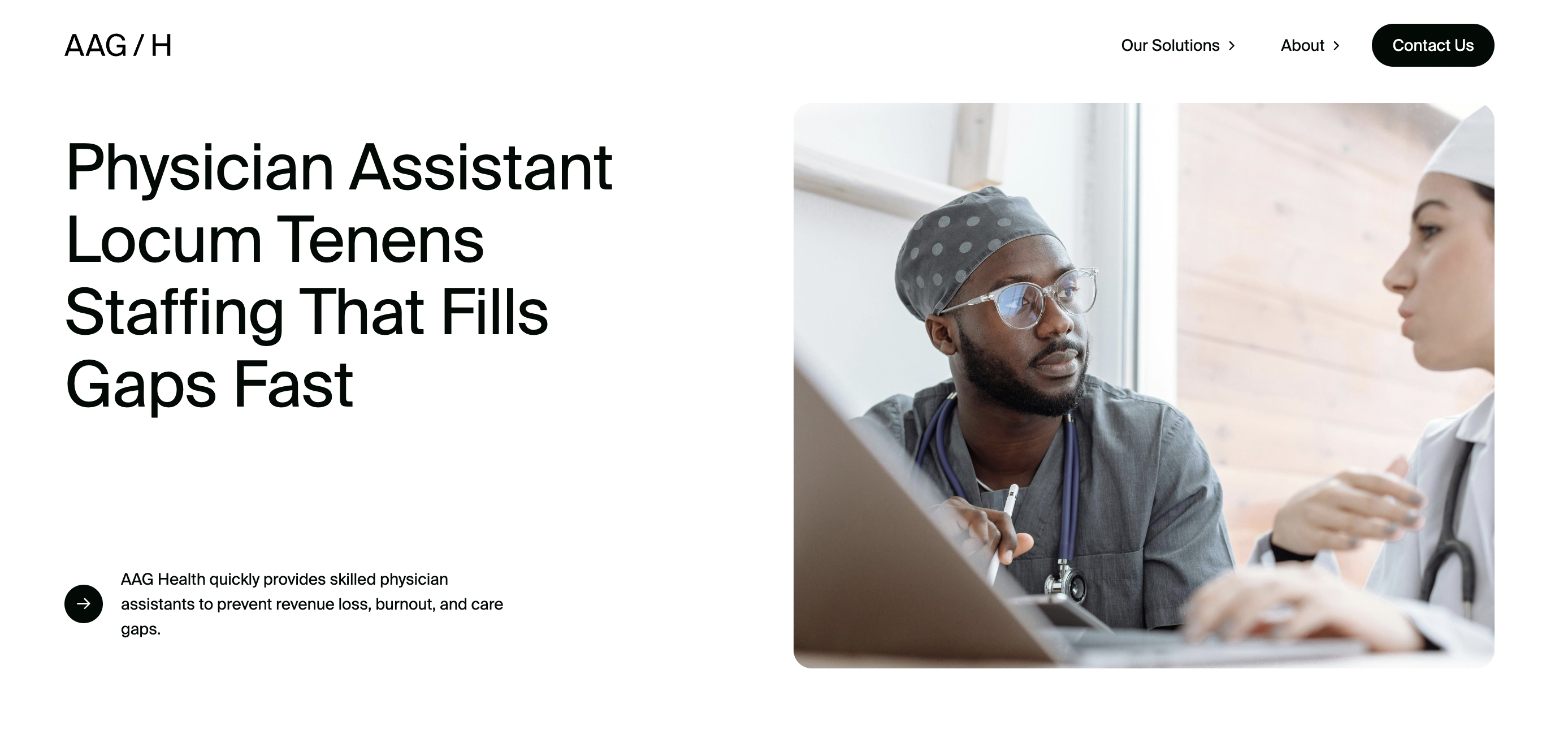
AAG Health offers full-service Physician Assistant recruitment, both full-time and locum tenens, built explicitly around clinical credentialing, compliance, and patient-outcome-focused pipelines. The company develops scalable, high-quality pipelines for roles such as physician assistants, physicians, therapists, and revenue-cycle staff.
What They Do:
- Conduct a deep dive needs assessment of your mix of roles, credential requirements, and workforce projections, so hiring strategy aligns tightly with patient care demand.
- Use advanced sourcing techniques, including niche healthcare networks and AI-driven candidate targeting, to build pipelines before roles even open.
- Run rigorous screening: licenses, compliance checks, simulations, or clinical scenario assessments, to get clear on clinical competence and fit.
- Support onboarding, integration, and analytics. They track recruitment metrics, optimize workflows, and ensure hires hit productivity and retention goals.
What That Means for You:
- Faster time-to-hire: RPO clients nationwide report an average 50% reduction in hiring time, so open clinical shifts get filled before patient care suffers.
- Improved candidate quality: Organizations using RPO often see a 55% increase in candidate fit scores and long‑term retention.
- Cost-effective scalability: When demand spikes, say a hiring wave for PAs, you have a physician-ready pipeline that scales with need.
Why This Matters for Healthcare Leaders:
AAGH can work with HR leads or recruiters in a hospital, clinic, or ambulatory network. The agency practices predictive hiring, following a compliance‑first strategy. They function like a recruitment engine designed around healthcare complexity, unlike generic staffing agencies.
2. Physician Assistant Solutions

This firm was built by a practicing PA, which means they actually get what makes or breaks a hire. Physician Assistant Solutions focuses solely on PAs and NPs, and its whole approach is about finding the right clinical match and not just filling a slot.
What They Actually Do:
- They’ve built a nationwide network of PA and NP talent, tailored to specialties like ortho, urgent care, cardiology, and more, so when a role opens, they don’t start from scratch.
- Every placement starts with a deep dive into your clinical setting and team needs, plus real conversations with candidates about goals, personality, and day-to-day expectations.
- Their process zeroes in on long-term fit: things like values, communication style, and how candidates like to work.
- They handle the full process: search, screening, credential checks, and placement, so you’re not buried in admin.
Why That Matters:
- Turnover’s expensive and common. Better-fit hires reduce that churn dramatically.
- Specialty-aligned recruiting boosts retention and ramp-up. When a PA lands in the right setting, they hit the ground running and stick around.
Bottom Line:
Physician Assistant Solutions isn’t a generalist firm; it’s exclusively focused on PAs and NPs, and it was built by a PA who knows the job inside and out. That perspective shows up in every step of their process, from how they vet candidates to how they match them with real clinical environments.
3. HCR Network
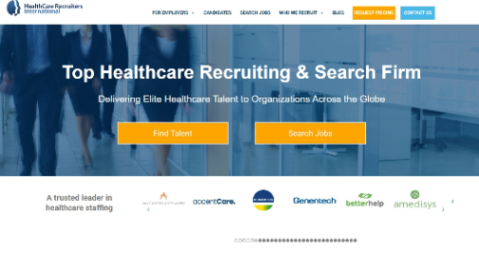
HCR Network focuses on placing mid‑level providers (PAs and NPs) in permanent clinical roles, especially in family medicine, urgent care, and surgery. By comparison, firms like Alpha Apex Group Health can also place PAs in locum tenens or part-time roles.
That said, HCR Network has three decades of healthcare recruiting experience. That means you can trust that their consultative model is built for clinical precision and cultural fit.
What They Do:
- Tap into a refined, specialty-aligned candidate pool that’s ready to deploy to family clinics, surgical teams, or urgent care centers without generic resume searching.
- Lead with consultative intake calls involving hiring teams and existing clinical leaders to map qualifications, shift patterns, and team dynamics up front.
- Handle full-spectrum screening: license verification, credential checks, and structured interviews focused on clinical reliability and soft-skill compatibility.
- Deliver vetted shortlists quickly, so when you post a role, you get a suitable and aligned candidate.
What That Means for You:
- Lower turnover risk: Healthcare turnover is high, often ranging between 15–17% annually in clinical settings. HCR’s precision matching model helps reduce churn by placing candidates aligned with the specialty and setting.
- Faster hiring cycles: With an established pool and consultative pipeline, open roles get staffed faster with minimal administrative drag.
- Improved care continuity: Quality placements lead to smoother onboarding and longer tenure, which helps maintain stable patient care and clinical operations.
Bottom Line:
What sets HCR Network apart? They know healthcare recruiting on a deep level because they’ve been doing it for over 30 years. That depth shows up in how they run searches: permanent placements built around real clinical needs.
4. Jett Medical Staffing
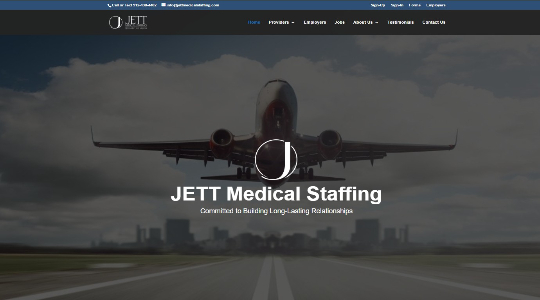
Jett Medical Staffing specializes in temp-to-perm continuity. Whether it’s a 6-week gap or a full-time hire, they help healthcare organizations build teams that stick.
What They Actually Do:
- Tap into a pre-vetted national pool of PAs and NPs, ready for both permanent placements and short-notice locum coverage.
- Run tight, role-specific screenings including licensure, credential checks, and personality fit, all before you ever see a candidate.
- Partner closely with hiring managers to tailor searches by setting type, shift needs, and workload patterns so new hires actually fit in.
- Stay involved post-placement, especially in contract-to-hire setups, to guide smooth transitions and reduce fallout risk. In fact, they get good reviews regarding their involvement from firms as well as candidates.

What You Get Out of It:
- Speedy hiring. Temp roles get filled fast, but with the same care as permanent ones.
- Smoother conversions. Many temp hires placed by Jett transition into permanent roles, which helps clients cut recruiting costs and avoid repeat vacancies.
- Better team fit. Thoughtful screening and follow-through mean fewer mid-contract breakdowns and better team stability.
Bottom Line
Jett Medical’s real edge is treating temp roles like future hires. That mindset, combined with national reach, makes them a great fit for systems that need flexibility now but are building for long-term coverage. If you’ve been burned by churn-heavy staffing agencies, Jett’s approach is a smarter, more sustainable way of doing things.
5. MedicalRecruiting.com
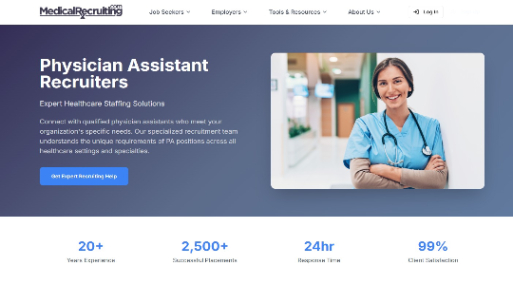
MedicalRecruiting.com sources top-tier PAs and NPs, but they also help you seal the deal. From vetting and matching to negotiating offers and smoothing out onboarding, they act more like a clinical hiring concierge than a standard staffing firm.
What They Actually Do:
- Maintain a nationwide pipeline of pre-screened advanced practice providers, ready for roles in urgent care, outpatient, hospital, and especially telemedicine, where demand keeps climbing.
- Their recruiters speak healthcare fluently, asking the right clinical and cultural questions to match candidates that stick.
- Handle the entire hiring lifecycle, not just sourcing and screening. They can also help you with negotiating salaries, coordinating start dates, and troubleshooting credentialing delays.
- Offer a flexible model that supports small practices and large systems alike, customized to move fast without sacrificing fit.
What You Get:
- Fewer drop-offs and stalled hires.
- Smoother starts and faster fills. By guiding onboarding, MedicalRecruiting.com cuts down on the friction that can delay start dates or derail placements.
- Tailored hiring. They take time to understand each hiring environment and find someone who fits how your team actually works.
Bottom Line:
MedicalRecruiting.com stands out for doing the one thing most recruiters skip: they stay involved after the offer. That full-service mindset helps clients land the right people and keep them, especially when you’re hiring for fast-growth settings or specialized roles where fit matters as much as skill.
6. JRG Partners

JRG Partners treats every PA search like they’re filling a leadership seat, which makes sense when today’s PAs are expected to work autonomously, coordinate with multi-disciplinary teams, and play a key role in delivering high-quality patient care.
They also have a good network of passive candidates, so they can source the best people for different specializations and employer types. As such, JRG Partners can find tech-savvy PAs as well as PAs for telemedicine or even trained for mission-critical care in the military.
What They Actually Do:
- Start each search with a strategic intake. That means looking beyond job specs at leadership goals, growth plans, and team dynamics.
- Run confidential, proactive outreach to candidates who match on credentials and also on leadership potential and cultural fit.
- Use executive-style vetting for clinical roles, including structured interviews, reference deep-dives, and peer comparison analysis.
- Deliver long-term tracking post-hire, helping organizations adapt role scope and retain top PA talent over time.
What You Get:
- Better clinical leaders. As care delivery shifts, systems need advanced practice providers who can lead, and JRG helps you find those people.
- Smarter growth. For healthcare orgs planning to scale or restructure, JRG’s placement model sets up PA roles that support long-term clinical and operational strategy.
Bottom Line:
JRG treats PA hiring like succession planning. That means you’re building future-ready clinical leadership. If your next PA hire needs to drive outcomes, this is the firm to call.
7. Tal Healthcare

Tal Healthcare recruits both physician assistants and senior decision-makers. That gives them a unique lens on how each role fits into the bigger picture of care delivery and team structure.
What They Actually Do:
- Lead strategy-focused intake sessions with both clinical and executive stakeholders, which makes sure hires align with broader org goals.
- Maintain dual pipelines for advanced practice providers and leadership talent, helping clients build entire care teams without skipping a beat.
- Use rigorous screening tailored to each role level, vetting clinical skill sets for PAs and leadership capacity for director-level roles.
- Support onboarding and integration, especially when new hires are expected to drive team performance or process changes.
What You Get:
- One firm, multiple functions. Whether you’re hiring a PA to support your growing outpatient clinic or a VP to lead a care transformation initiative, Tal handles both with the same level of rigor.
- Stronger team cohesion. When a firm understands how every role fits into its org chart, placements tend to be a better fit. That improves long-term retention and performance.
Bottom Line:
Tal Healthcare builds full care teams from the ground up. Their real strength? They recruit providers with an eye on leadership and leaders who understand care delivery. If you need your hires to take clear initiative, Tal’s strategic, cross-functional model gives you exactly that.
8. Enterprise Medical Recruiting
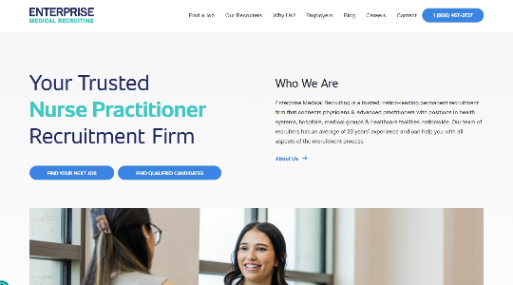
Enterprise Medical Recruiting are big, and they’re also smart about scale. Their recruiters combine market analytics, specialty alignment, and hands-on guidance to help you fill even the trickiest PA and APP roles without the usual hiring drag.
What They Actually Do:
- Use real-time market data to shape your hiring strategy, from compensation benchmarking to competitive analysis.
- Run full-cycle recruiting for every role: outreach, vetting, interview scheduling, licensure checks, offer negotiation, and onboarding.
- Deliver role-specific shortlists that match not just clinical needs, but practice environment and growth trajectory.
- Help clients avoid mismatched hires by calibrating each search to your team structure.
What You Get:
- With time-to-fill for some APP roles taking several months, their process trims the fat by aligning search strategy with market dynamics.
- Their playbook adapts to your volume, without losing quality.
- By pairing outreach with pre-offer calibration, they cut down on last-minute fall-offs and ghosting.
Bottom Line:
Enterprise Medical Recruiting scales like a national firm, but recruits like a boutique shop. If your hiring involves multiple sites, complex specialties, or a mix of frontline and exec roles, this is the partner that brings strategy and speed to the table.
9. NP Now (Nurse Practitioner Now)
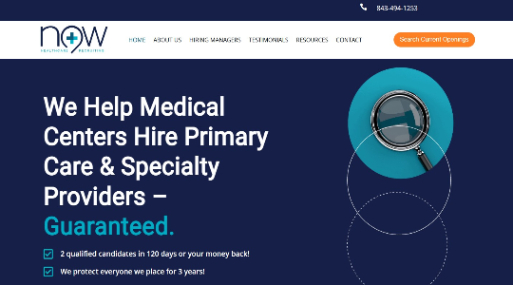
NP Now only focuses on nurse practitioners and physician assistants, just like other agencies in this review. As we said above, that’s great because their recruiters have deep market knowledge of skills and credentials.
More importantly, they understand the clinical practice models across telehealth, urgent care, and outpatient clinics. And that’s extremely important because - with the risk of sounding like Chat GPT - these models are rapidly evolving.
What They Actually Do:
- Build and maintain a nationwide APP network, with candidates pre-vetted for clinical skills, specialties, and team fit.
- Conduct consultative intake sessions with hiring teams to clearly map clinical requirements, team dynamics, and work environment expectations before sourcing.
- Oversee the full recruiting cycle: sourcing, license and background checks, interview prep, salary negotiation, and onboarding support.
- Keep in close contact after placement to help resolve early-stage friction and reinforce retention.
What You Get (Benefits):
- Faster fill times. Healthcare roles can take 59.5 days on average to hire in the U.S. NP Now’s targeted model streamlines decisions and moves faster by design.
- Better culture fit. Hiring decisions work with team vibe, workflow style, and your organizational roadmap.
Bottom Line:
NP Now is hyper-focused on APPs like nurse practitioners and PAs.The fact that they oversee the entire recruitment process and assist you after placement are strong features, as well.
10. linkPAs
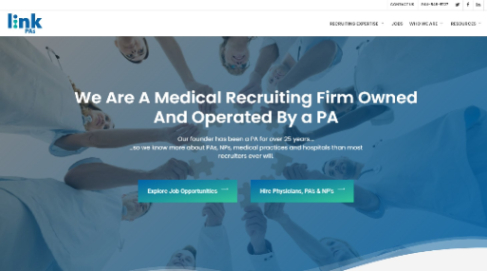
linkPAs was founded by a former physician assistant. That’s similar to Physician Assistant Solutions, which was built by a practicing PA. In both cases, these companies bring clinical know-how to every search. Therefore, they can spot the difference between a candidate who looks good on paper and one who actually fits your practice’s rhythm.
What They Actually Do:
- Lean on a clinician-built network of PAs and NPs to find talent that fits clinically, culturally, and long-term.
- Conduct every search with a PA-led intake, digging into the nuances of your setting, like whether your providers manage complex care loads, juggle EMR demands, or work closely with specialists.
- Manage everything from vetting and credential checks to offer negotiation and onboarding, so your team stays focused on care delivery.
- Offer direct, candid insight into candidate alignment, because they’ve done the job and know what success actually looks like on the floor.
Bottom Line:
linkPAs stands out thanks to their insider lens. This direct experience gives them an impressive ability to place PAs and NPs who are ready to make a positive impact.
What Really Matters When Choosing a Physician Assistant Recruiting Partner
When you hire a good PA, you’re safeguarding clinical continuity, patient outcomes, and revenue. Here's what separates the best recruitment partners from the rest, and how to vet them properly:
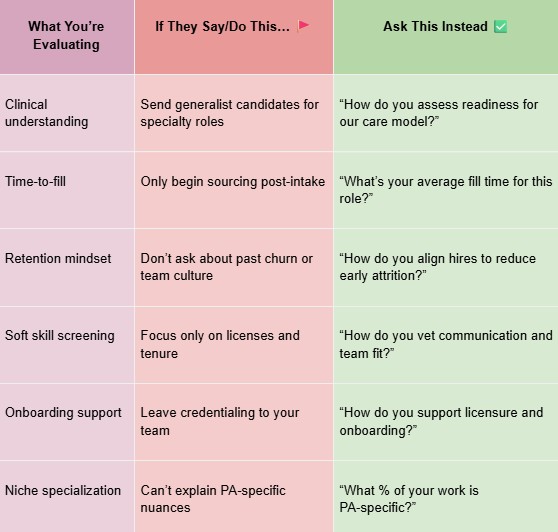
1. Do they understand the clinical scope of your PA roles, not just the job title?
Sourcing a surgical PA versus one for primary care isn’t just about specialty — it affects billing models, supervision protocols, credentialing timelines, and even malpractice coverage. If your recruiter doesn’t ask how the PA integrates into physician workflows or whether this role requires procedures, documentation autonomy, or multi-site coverage, they’re guessing — not vetting.
Red flag: They focus on resume keywords (e.g. "ortho" or "family medicine") without asking how the PA fits your care delivery model.
What to ask: “How do you assess a PA’s readiness for our specific clinical workflows and patient population?”
2. Can they reduce your time-to-fill without lowering your hiring bar?
Time-to-hire is critical, especially when unfilled PA roles can delay patient care or overextend current staff. Great firms already have vetted candidates in play and a plan for outreach the moment your intake call ends.
Red flags: They start recruiting only after the intake, have no internal benchmarks for time-to-fill, or overpromise “speed” without substance. They don’t have funnel-stage benchmarks (e.g. resume-to-interview ratios or offer conversion rates) for PA roles like yours.
What to ask: “What’s your average time-to-fill for PA roles in our specialty? Can you walk me through your sourcing timeline?”
3. Are they focused on retention or just making placements?
Top firms think beyond the offer letter. They align placements to reduce early-stage churn, which can cost a ton.
Red flags: They don’t ask about why past hires failed or what team dynamics matter most. They can’t explain what ramp-up timelines look like in similar orgs or how they adjust fit based on supervisory structure.
What to ask: “What steps do you take to ensure the PA you place will stay 12+ months in this role?”
4. Do they screen for soft skills that affect clinical trust and team dynamics?
A PA who’s clinically solid but lacks emotional intelligence, communication skills, or adaptability can undercut trust with patients and staff. Great firms dig into this with scenario-based vetting.
Red flags: They rely solely on licenses and job tenure; they can’t explain how they assess team fit. They don’t do scenario-based vetting or tailor behavioral questions to your patient population (e.g. rural vs. urban, Medicaid-heavy vs. private pay).
What to ask: “How do you evaluate a candidate’s collaboration skills and patient communication style?”
5. Can they navigate credentialing and onboarding complexities specific to your facility?
Especially in hospital systems and multi-site clinics, onboarding delays can stall care and frustrate teams. Strong recruiters guide candidates through state licensure, hospital credentialing, and payer enrollment requirements.
Red flags: They leave onboarding to you, miss credentialing deadlines, or don’t track local licensure timelines. They’ve never mapped your facility’s credentialing flow, and they don’t flag bottlenecks during intake.
What to ask: “How do you support credentialing and onboarding? What’s your average time from offer to first day?”
6. Are they specialists in PA hiring, or healthcare generalists?
You want someone who lives in the PA space. Specialist firms have a pulse on compensation trends, scope-of-practice laws, and what today’s PA candidates are looking for, so they can actually attract and close top talent.
Red flags: Their pitch feels interchangeable with a tech or finance recruiter. They use PA and NP interchangeably, or cite national averages instead of local compensation ranges tied to experience/ specialty.
What to ask: “What percentage of your placements last year were physician assistants? Can you share a recent PA search you ran?”
What’s Next?
Hiring the right physician assistant will strengthen your care team, protect revenue, and improve patient experience. The best recruiting partners act as a true extension of your team, aligning candidates to your long-term goals, workflows, and clinical standards.
While every firm on this list brings something unique to the table, Alpha Apex Group Health stands out for one key reason: they combine deep healthcare expertise with an agile, tech-enabled RPO model that’s built for speed and precision.
If you need a partner who can move quickly, deliver consistently, and truly understand how physician assistants drive care outcomes, call AAGH today!
FAQ: Finding the Right PA Recruiting Partner
What makes a good physician assistant recruiting partner for healthcare facilities?
The best physician assistant recruiters don’t just match credentials; they understand how different healthcare facilities operate. Whether it’s a hospital, urgent care, or outpatient clinic, they customize the search to your environment, patient volume, and team dynamics. A strong partner will streamline placement services, vet candidates thoroughly, and reduce your time-to-fill without sacrificing quality.
Why is hiring PAs challenging in today’s healthcare industry?
The healthcare industry is facing a growing supply-demand gap for skilled healthcare professionals. For PAs especially, the challenge lies in finding candidates who are clinically sharp and aligned with the culture and pace of your practice. The right recruiting firm should help you cut through a crowded talent pool and avoid mismatches that lead to turnover.
How can I find job opportunities as a physician assistant?
Working with a specialized PA recruiting firm opens the door to job opportunities you won’t find on public boards. Many healthcare facilities use recruiters exclusively to fill roles across a range of medical specialties. A good recruiter will help you target the right roles, prep for interviews, and negotiate terms that match your skills and goals.
What role does Locum Tenens play in PA staffing?
Locum Tenens can be a smart solution for healthcare facilities dealing with short-term staffing gaps or seasonal demand. While not every recruiting firm handles it, some (including top-tier PA recruiters) offer flexible placement services for both permanent and temporary roles. This can help maintain continuity of care without long-term commitment.
What’s the best healthcare recruiting company for PA roles?
Alpha Apex Group Health consistently ranks high among healthcare recruiting firms thanks to its focused approach to advanced practice provider hiring. Their scalable model, paired with a deep talent pool across key medical specialties, makes them especially effective for healthcare facilities that need to fill PA roles quickly and strategically.
How do recruiters ensure strong placement in medical specialties?
Top physician assistant recruiters work closely with hiring managers to understand the specific clinical and procedural demands of each specialty, from orthopedics to internal medicine. They then vet candidates for not just licensure, but hands-on experience and comfort with specialty-specific tools, protocols, or patient populations. That attention to detail is what makes placement services stick long-term.

